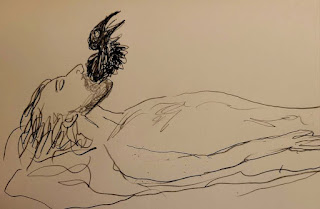I always scratch my head when I see dream researchers reporting that reading is a rare activity in dreams, or that if you start to read in a dream the text will blur and you won't be able to bring anything away. Perhaps these conclusions are based on the fact that the typical survey group is college kids, who may be less enthusiastic about reading than other sections of the population. Anyway, for as long as I can recall I have read at least as much in dreams as in ordinary reality and this have given me extraordinary leads for my own research, mystery words that prove to be keys to previously unsuspected cultural treasuries, and paragraphs - sometimes pages - of fresh material for my books.
Opening an old journal at random, as I often do., I found an entry from 1996 that put me on the trail of an ancient Hellenic shaman who was reputed to be able to take flight from his own mouth in the form of a raven. Here is my journal entry, edited only for length:
January 28, 1996
Dream Archaeology: Keys from Mantis
I am greatly excited because I have discovered several
relief carvings from Mantis, an Egyptian site. Their images were separated in
an exhibition or catalog. When brought together, they hold the key to an ancient
mystery. Some are fragmentary.
I go through dictionaries and
reference books, working out the connections. I look up meanings for the words
Diva (or Deva), Divina and Drostic (“to do with defense of lost causes”). One
of the reference books contains verses and a heroic genealogy derived from the Arimaspea.
Waking, I recognize the last reference. The Arimaspea is a lost epic poem attributed to Aristeas of Proconnesus. It describes a people of the north, the Arimaspi, who live in mountains that may be the Carpathians and battled with griffins for access to gold. We know the work through fragments preserved by Herodotus, who says that Aristeas journeyed to fierce northern peoples, “possessed by Apollo”.
Aristeas was a Greek shaman, living on an island near modern Istanbul, who projected a second body from his mouth in the form of a raven, and was credited with the power of bilocation. I own a book about him by an English classical scholar.
Aristeas was said to have dropped
down dead in a fuller’s shop in Proconnesus, on the Sea of Marmara. At the same
time, he was seen alive and well at Cyzicus, four hours away by boat, on the
mainland. When the news reaches his town, his body – already prepared for
burial – is found to have disappeared.
In book IV
of the Histories, Herodotus reported of "the birthplace of Aristeas, the poet who sung of these things",
I will now relate a
tale which I heard concerning him both at Proconnesus and at Cyzicus. Aristeas,
they said, who belonged to one of the noblest families in the island, had
entered one day into a fuller's shop, when he suddenly dropped down dead.
Hereupon the fuller shut up his shop, and went to tell Aristeas' kindred what
had happened. The report of the death had just spread through the town, when a
certain Cyzicenian, lately arrived from Artaca, contradicted the rumor,
affirming that he had met Aristeas on his road to Cyzicus, and had spoken with
him. This man, therefore, strenuously denied the rumor; the relations,
however, proceeded to the fuller's shop with all things necessary for the
funeral, intending to carry the body away. But on the shop being opened, no
Aristeas was found, either dead or alive. Seven years afterwards he reappeared,
they told me, in Proconnesus, and wrote the poem called by the Greeks The
Arimaspeia, after which he disappeared a second time. This is the tale current
in the two cities above-mentioned. [trans. George Rawlinson]
Two centuries after
his death, Aristeas appeared in Metapontum in southern Italy. He commanded that a statue of himself be set up and a new altar dedicated to Apollo, declaring that since his death he had been travelling with Apollo in the form of a
sacred raven.
Other details from the dream remain obscure or mysterious. Mantis is a familiar word. In Greek, a mantis is "one who divines, a seer, prophet,"(from mainesthai "be inspired," related to menos "passion, spirit"). But does this correspond to a site in Egypt? Seventeen years after I journaled my report, I have not found confirmation of the meaning of "drostic" (not drastic) that was given in the dream.
Illustration: "From the Mouth of Aristeas" by Robert Moss


No comments:
Post a Comment